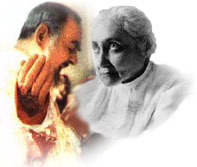“He
knew and loved Luisa and her Writings”—an interview with
Adriana Palotti.
Adriana Pallotti is a wonderful
lady who lives in San Giovanni Rotondo (Foggia, Italy), where
she founded the “House of Prayer for the Kingdom of the Divine
Will.” She is originally from Modena (Northern Italy), but
she moved to San Giovanni Rotondo many years ago, “...to live
close to Padre Pio...”, as she says. Padre Pio, then,
became her Confessor and Spiritual Director.
In San Giovanni Rotondo, she attended
the Cenacles of Federico Abresch on the Divine Will, when Luisa
was still alive. During the 40's , Federico Abresch became a close friend
and disciple of Luisa. He used to visit her house and learn, directly
from her and from her manuscripts, of the Sublime Truths of Living in
the Divine Will. He exchanged frequent correspondence with Luisa.
In the following interview, made in 1994, on the occasion of the Fiftieth
Anniversary of the passage into Heaven of Luisa Piccarreta, Miss Adriana
Pallotti gives clear testimony on the fact that Padre Pio knew and loved
Luisa and her Writings. She also gives wonderful testimony on the conversion
of Federico Abresch through Padre Pio, on the First “Divine Will”
Cenacle in the San Giovanni Rotondo, and on direct and specific comments
of Padre Pio regarding the spreading of the writings of Luisa.
I was surprised upon seeing that
the lunch of Luisa consisted of just 4 or 5 orecchiette
[pasta
with the shape of “little ears", typical food from Puglia]
and a few grapes, which I myself had brought an hour before. Everything
was placed on a little plate. After my aunt put grated cheese on it, she
told me: “Take it to Luisa.”
Surprised by this
strange meal, I brought
the food to the little room of Luisa. She welcomed me with a smile, placed
the plate on the appropriate bed table, made the sign of the cross, and
began to eat. Feeling my state of amazement, Luisa smiled at me again,
then took a grape and offered it to me. When Luisa finished her lunch
(so to speak), she rang a little bell, and soon my aunt appeared,

Padre Pio and Luisa Piccarreta
carrying a little
tray in her hands. Here began the scene, which I will never be able to
forget: Luisa brought up everything in a strange way; I say this, because
I felt no repugnance; on the contrary, a strange fragrance diffused throughout
the room. Then, removing the little bed table, my aunt closed the shutters
and said: “Come Peppino, let’s go eat, for Luisa has to sleep.”
My aunt brought to the table the food brought up by Luisa, and there it remained
during our lunch. I counted the orecchiette – they were six, and
all the grapes, whole and bright – precisely eleven.
Highlights on Federico Abresch
Federico, Amalia and their son Pio Abresch,
friends of Padre Pio, were also admirers of Luisa. The book “Padre
Pio: The True Story” by C. Bernard Ruffin, states “Friedrich
Abresch, a native of Germany who came to see Padre Pio in 1925, at the
age of twenty-eight, out of pure curiosity. A nominal Lutheran in his
youth, he had become Roman Catholic on marrying an Italian but did not
practice his religion. “I had no faith,” he admitted.
…. Padre Pio did not expel Abresch from the confessional, but he
did make him, as he put it, ‘understand immediately that in my
previous confessions I had committed certain mortal sins.’…
‘He concealed his knowledge of my entire past under the form of Questions.
He enumerated with precision and clarity all of my faults, even mentioning
the number of times I missed Mass!’
Pio became a Monsignor
In 1926, a year later, Abresch’s wife began to hemorrhage, and doctors
diagnosed a tumor in her womb….Amalia Abresch was devastated by the
certainty that a hysterectomy would leave her incapable of bearing children,
so she went to Padre Pio. He told her not to submit to the knife. After
that, the hemorrhages ceased and, although the tumor remained, to her
great delight, she conceived and, at the age of nearly forty, gave birth
to a son. The boy, who was named

